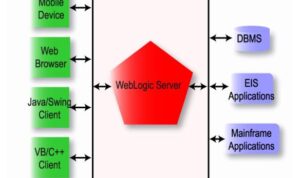Embark on a journey into the world of dedicated server hosting, where websites thrive on unmatched performance and reliability. Discover the key aspects and advantages that make dedicated servers the top choice for businesses and individuals alike.
Delve deeper into the realm of dedicated server hosting and uncover the secrets behind its unparalleled capabilities.
Overview of Dedicated Server Hosting
Dedicated server hosting refers to a type of web hosting where a client leases an entire server exclusively for their website or application. This means that the client has full control over the server, including the choice of operating system, hardware, and software configurations.
Benefits of Using Dedicated Server Hosting
- Enhanced Performance: With dedicated resources, your website or application can handle high traffic volumes without slowdowns.
- Improved Security: Since you are not sharing the server with other users, the risk of security breaches is significantly reduced.
- Customizability: You have the freedom to customize the server according to your specific requirements and preferences.
- Reliability: Dedicated servers offer high uptime guarantees, ensuring that your website is always accessible to users.
- Scalability: As your business grows, you can easily scale up resources on a dedicated server to accommodate increased demand.
Typical Features of Dedicated Server Hosting Providers
- 24/7 Technical Support: Dedicated hosting providers typically offer round-the-clock support to assist with any server-related issues.
- Hardware Redundancy: To ensure maximum uptime, providers often implement redundant hardware components in their servers.
- Control Panel Access: Most dedicated server hosting plans include access to a control panel for easy server management.
- Backup and Storage Options: Providers may offer backup services and storage solutions to safeguard your data.
- Server Monitoring: Monitoring services help detect and address any performance or security issues proactively.
Types of Dedicated Server Hosting
When it comes to dedicated server hosting, there are different types available in the market to cater to various needs and preferences. Two primary types are managed and unmanaged dedicated server hosting. Let's explore the differences between them and discuss the scalability options in dedicated server hosting.
Managed vs. Unmanaged Dedicated Server Hosting
Managed dedicated server hosting involves the service provider taking care of all the technical aspects of server management, including software updates, security patches, backups, and monitoring. This type of hosting is ideal for those who prefer a hands-off approach and want the peace of mind that their server is being managed by experts.
On the other hand, unmanaged dedicated server hosting puts the responsibility of server management on the client. While this option provides more control and customization options, it requires a high level of technical expertise to handle server operations effectively.
Scalability Options in Dedicated Server Hosting
Scalability is a crucial factor to consider when choosing a dedicated server hosting solution. Most providers offer various scalability options to accommodate the changing needs of businesses. Vertical scalability involves upgrading the resources of a single server, such as CPU, RAM, and storage, to meet increased demands.
Horizontal scalability, on the other hand, involves adding more servers to distribute the workload and enhance performance. Some providers also offer hybrid scalability options, combining both vertical and horizontal scaling to achieve optimal flexibility and efficiency in resource allocation.
Factors to Consider When Choosing a Dedicated Server Hosting Provider
When selecting a dedicated server hosting provider, there are several crucial factors to take into consideration to ensure you choose the best option for your needs.
Uptime, Security, Support, and Pricing
- Uptime: One of the most critical factors is uptime, which refers to the amount of time a server is operational and accessible. Look for a provider that guarantees high uptime to ensure your website or application remains online.
- Security: Ensure that the hosting provider offers robust security measures such as firewalls, DDoS protection, and regular security updates to safeguard your data and information.
- Support: Opt for a provider that offers 24/7 customer support through various channels like live chat, phone, or email to address any issues promptly.
- Pricing: Compare pricing plans and consider the overall value you receive for the cost. Look for transparent pricing without hidden fees.
Server Location
The location of the server can impact the performance of your website or application. Choose a hosting provider with data centers located close to your target audience to minimize latency and ensure faster load times.
Bandwidth and Data Transfer Limits
- Bandwidth: Consider the amount of bandwidth included in your hosting plan, as it determines the amount of data that can be transferred between your server and users. Ensure you have enough bandwidth to support your traffic needs.
- Data Transfer Limits: Some hosting providers impose data transfer limits, which can lead to additional charges if exceeded. Make sure to understand these limits and choose a plan that meets your requirements.
Setting Up a Dedicated Server
Setting up a dedicated server requires careful planning and execution to ensure optimal performance and security. Below is a step-by-step guide on how to set up a dedicated server, along with best practices for optimizing server performance and configuring security settings.
Step-by-Step Guide to Setting Up a Dedicated Server
- Choose a reliable dedicated server hosting provider that meets your requirements for performance, storage, and bandwidth.
- Select the operating system you want to install on the server, such as Windows Server, Linux, or Unix.
- Configure network settings, including IP address assignment, DNS configuration, and firewall setup.
- Install necessary software and applications based on your specific needs, such as web servers, databases, and security tools.
- Set up user accounts and permissions to control access to the server and its resources.
- Regularly update the server's software, operating system, and security patches to protect against vulnerabilities.
- Monitor server performance and resource usage to identify and address any issues proactively.
Best Practices for Optimizing Server Performance
- Optimize server hardware by using high-quality components and ensuring sufficient RAM, CPU, and storage capacity.
- Tune the server's settings for optimal performance, such as adjusting caching mechanisms, load balancing, and resource allocation.
- Implement a content delivery network (CDN) to reduce latency and improve website loading speeds for users around the world.
- Regularly clean up unnecessary files, databases, and logs to free up disk space and improve server performance.
- Monitor server performance metrics, such as CPU usage, memory usage, and disk I/O, to identify bottlenecks and optimize resource allocation.
Configuring Security Settings for a Dedicated Server
- Enable firewall and intrusion detection systems to monitor and block malicious network traffic attempting to access the server.
- Implement encryption protocols, such as SSL/TLS, to secure data transmission between the server and clients.
- Regularly update security patches and software to protect against known vulnerabilities and security threats.
- Use strong passwords, two-factor authentication, and access controls to prevent unauthorized access to the server.
- Regularly conduct security audits and penetration testing to identify and address potential security weaknesses proactively.
Managing and Maintaining a Dedicated Server
When it comes to managing and maintaining a dedicated server, there are several important tasks that need to be carried out regularly to ensure optimal performance and security.
Common Maintenance Tasks
- Regular Software Updates: Keeping the operating system and all software applications up to date is crucial to patch any vulnerabilities and ensure smooth operation.
- Security Audits: Conducting regular security audits to identify and address any potential security risks or breaches.
- Data Backups: Implementing a robust backup system to prevent data loss in case of hardware failure or accidental deletion.
Role of Monitoring Tools
Monitoring tools play a vital role in managing a dedicated server by providing real-time insights into server performance, resource utilization, and potential issues.
- Resource Monitoring: Monitoring CPU, memory, disk space, and network usage to identify any bottlenecks or performance issues.
- Alerts and Notifications: Setting up alerts for critical events such as high CPU usage, disk space running low, or service failures to take immediate action.
- Performance Optimization: Using monitoring data to optimize server performance by identifying and resolving performance bottlenecks.
Tips on Troubleshooting
- Check Logs: Review server logs to identify any error messages or warnings that can help pinpoint the root cause of issues.
- Network Connectivity: Verify network connectivity and firewall settings to ensure proper communication with the server.
- Hardware Check: Inspect hardware components for any signs of failure or malfunctions that may impact server performance.
Last Recap
In conclusion, dedicated server hosting emerges as the cornerstone of a robust online presence, offering unmatched performance and control. Dive into the world of dedicated servers and witness the transformation of your digital landscape.
FAQ
What is dedicated server hosting?
Dedicated server hosting involves leasing an entire server for exclusive use, providing high performance and control over server resources.
What are the benefits of using dedicated server hosting?
Dedicated server hosting offers enhanced security, customization options, and high performance, ideal for websites with high traffic or specific requirements.
How do managed and unmanaged dedicated server hosting differ?
Managed hosting includes server management by the provider, while unmanaged hosting requires the user to handle server administration tasks.
What factors should be considered when choosing a dedicated server hosting provider?
Factors like uptime, security features, customer support, pricing, server location, bandwidth, and data transfer limits are crucial in selecting a reliable hosting provider.
What are some common maintenance tasks for managing a dedicated server?
Regular updates, backups, security checks, and monitoring server performance are essential maintenance tasks for dedicated servers.







